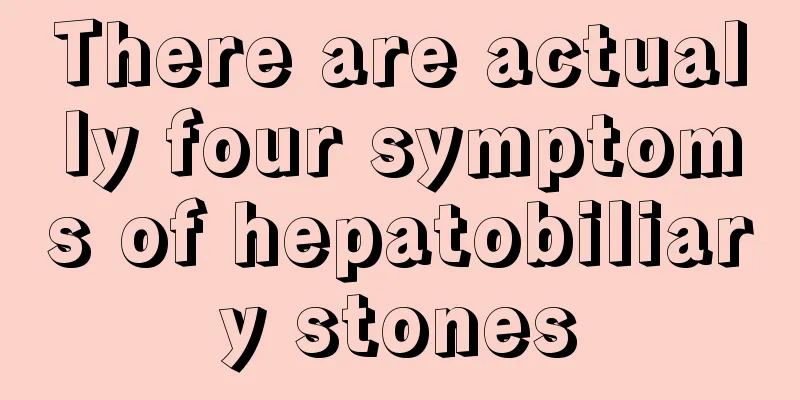Postoperative care for gallstones

|
Once gallstones gather in large numbers, it is easy to cause gallbladder obstruction. To cure it, it is best to remove the stones from the body through surgery. However, postoperative care is very important. The body is relatively weak after surgery, and attention needs to be paid to diet, living habits, wound care and other aspects in order to better restore gallbladder health. So how to perform postoperative care? What should family members of patients do after gallstone surgery? 1. You need to eat after the operation. After the gas is discharged, you can take a gradual diet according to the bowel movement. 2 After the operation, take deep breaths and cough more often, and turn over in bed every two hours (sports food) to facilitate lung expansion and promote wound healing. 3. Do appropriate out-of-bed activities accompanied by a nurse or family member to prevent surgical complications. 4 If the wound is painful, you can inform the nursing staff and give painkillers if necessary. 5 If the wound has no exudate, it will be sealed with paper tape and kept clean and dry; if the wound is moist, it should be disinfected from the inside out with a cotton swab at least once a day or when necessary, and then covered with gauze. 6 Generally, the patient can be discharged from the hospital after 3-5 days of hospitalization. The stitches will be removed on the seventh day after the operation (depending on the healing of the wound). Therefore, the patient will return to the outpatient clinic to remove the stitches according to the schedule after discharge. 7 Generally, you can take a shower 2 days after the stitches are removed. 8 Within 6 weeks after surgery, avoid lifting objects weighing more than 2 kg to prevent increased abdominal pressure. 9 Please adopt a low-fat (oily food) diet after surgery. Precautions 1. Pay attention to dietary structure A reasonable dietary structure is one of the most effective preventive measures to reduce the incidence of cholelithiasis and gallbladder cancer. Patients with gallstones should pay attention to dietary adjustment after surgery, and their diet should be diversified. They should eat more fresh fruits and vegetables rich in fiber, such as bananas, sweet potatoes, tomatoes, potatoes, carrots, cauliflower, eggplant, brown rice, seaweed, etc. Be careful to eat less foods rich in animal fat, such as eggs, cream, butter, liver, fish eggs, etc., to prevent the patient's cholesterol from rising. At the same time, you should pay attention to eating less irritating foods such as peppers, curry, spices, and carbonated drinks to prevent the formation of stones. 2. Pay attention to postoperative care Patients with gallstones must absolutely fast on the first day after surgery. They can drink a small amount of thin rice soup. On the second day, they can eat some easily digestible soft food, and then adopt a gradual diet. Patients should pay attention to taking deep breaths more often after the operation and turn over in bed once an hour, which is conducive to lung expansion and faster wound healing. Take a bath one week after the sutures are removed. Within two months after the operation, pay attention to prevent excessive abdominal pressure and try to avoid lifting heavy objects. 3. Pay attention to the rules of life After surgery, patients with gallstones should pay special attention to maintaining a regular life. They should pay attention to eating three meals a day on time and in fixed quantities. They must eat less for dinner, such as drinking a glass of milk or eating an egg, and avoid being too full or too hungry. They should try to avoid staying up late and minimize the chance of long-term business trips. Obese patients should pay attention to losing weight and keep their weight within a reasonable range. Women should try to reduce the number of pregnancies and take contraceptive measures. They should pay attention to quitting smoking and drinking to prevent bile stasis and wound infection, which can induce recurrence of gallbladder disease. 4. Pay attention to the combination of work and rest Patients with gallstones should ensure adequate sleep after surgery and rest for at least 8 hours a day; they should pay attention to choosing appropriate sports and carry out appropriate activities to improve their immunity; they should avoid overwork as much as possible, do not stay up late or drink coffee or watch horror movies before going to bed; do not work in a sitting position for a long time, stand up every hour to stretch your waist and move your limbs, and try not to wear tight clothing. |
>>: What medicine should I take for gallbladder crystals
Recommend
Complications after stoma reversal
There are often many problems in our intestines. ...
What are the uses of mulberry leaves
Maybe many friends don’t know what kind of leaves...
Skiing precautions, six things to pay attention to when skiing
Skiing is a very popular sport. The thrill of sli...
Is physical therapy for weight loss harmful to the body?
Obesity has become a disease phenomenon, and the ...
Mid-stage symptoms of brain cancer
Mid-stage symptoms of brain tumors can cause grea...
Is it better to take a bath or to steam?
Now people's living standards are constantly ...
Benefits of hypoglycemic bitter melon
The problem of high blood sugar can easily cause ...
What is the most effective way to relieve stiff neck? Here are some tips to relieve it
Sleep is very important for the human body, but i...
Indoor plants that remove formaldehyde
Nowadays, new houses will produce a substance cal...
What is the reason for high urine occult blood?
Studies have found that there are many clinical r...
If you have repeated oral inflammation, be alert to these diseases
Oral inflammation is also called oral ulcer. Some...
What is the reason for spots on the forehead
Many people have spots on their foreheads, which ...
Is the stone-removing and gallbladder-removing granule effective?
The Stone-Removing and Gallbladder-Removing Granu...
Does Panax notoginseng damage the liver?
Panax notoginseng is a relatively common medicine...
How to reasonably use traditional Chinese medicine to treat pancreatic cancer
Traditional Chinese medicine can play an importan...









